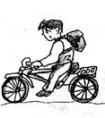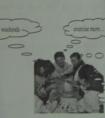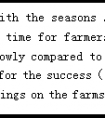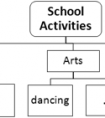Five students went out for a one-week trip in the countryside. When they returned, the group leader wrote a report about each student. _A. He was getting on v-九年级英语
题文
Five students went out for a one-week trip in the countryside. When they returned, the group leader wrote a report about each student. _
小题1: The food was so terrible. I missed my parents so much. How comfortable when I was at home! 小题2:What a pity! Everything was going well, and then I hurt myself. The last few days were quite boring. 小题3: I love this kind of trip! I always had some new things to do and learn. It was great fun helping organize activities. 小题4:They wanted me to get out of bed very early, and be ready for the day’s activities soon. Then they got angry when I kept them waiting. 小题5:I was often very lonely. I had problems making friends. Some of the activities were dangerous. I think I made the mistake of going on this trip. |
答案
小题1:E 小题1:A 小题1:C 小题1:B 小题1:D |
小题1:这题的I missed my parents so much.和E项的 He missed home very much. 一致 小题1:这题的Everything was going well, and then I hurt myself.和A项的 he hurt his foot on the third day. 一致 小题1:这题的I always had some new things to do and le arn. It was great fun helping organize activities.和C 项的He always wanted to be first to try a new activity一致。 小题1:这题的They wanted me to get out of bed very early,和B项的but found it very difficult to get up in the morning and often kept theothers waiting.一致 小题1:这题的I was often very lonely. I had problems making friends.和D项的She was very shy and easily frightened. It was hard for her to make friends.一致。 |
据专家权威分析,试题“Five students went out for a one-week trip in the countrysid..”主要考查你对 问答题,连词成句,日常用语、谚语,情景交际 等考点的理解。关于这些考点的“档案”如下:
问答题连词成句日常用语、谚语情景交际
考点名称:问答题
- 问答题:
主要是根据前提问题来做出相应的要求内的答案,题型比较灵活但是考查了学生多方面的知识和技能。 - 要做好这类题,就要注意平时知识的积累,包括单词、词组、句型等。
考点名称:连词成句
- 连词成句:
即是把错乱排列的词语根据语法或句法特点排列组合成为句式整齐,内容恰当,语气流畅的句子的方法。
他基本的要求是句子完整和流畅没有语法错误,更不要有语病。 连词成句题做题技巧:
首先强调第一个单词的第一个字母要大写,其次句子的最后要有标点符号。然后分句型来做:
1. 陈述句的时候,先找主语,然后找动词,再找其他,记得时间和地点是放在后面的。
2. 疑问句时,有疑问词的情况下找疑问词,然后找助动词,找主语,找其他。没有疑问词的情况下,就找助动词/be动词,再找主语,找其他。
3. 做这一类型的题目时,学生要有一定的基础,会认读单词,熟悉基本句型。
具体可以分一下几步来完成:
一、看清标点符号
1.如果是句号,则是陈述语句。陈述句的基本结构就是主语+谓语+宾语而构成的。
2.如果是问号,则是疑问语句。要先看是特殊疑问句还是由情态动词引导的疑问句。
①如果有where 、what、how等疑问词,那么它就是特殊疑问句,就要把疑问词where 、 what、 how 等放在一句话的最前面,它后面紧接的是be动词也就是我们学习过的am、is、are三个单词。
②如果题目中有can、 may、shall、would等情态动词,那么它就是由情态动词引导的疑问句。
例如:“have I a may new bike (?)” 。这道题目中有一个情态动词may,很显然这就是由情态动词may引导的疑问句。那么我们就要把may放在句子的最前面,后面紧接的就是这句话的主语(主语往往是人或者物)。
很快我们就能写出这句话的前半部分“May I have …”很显然,还剩下的几个单词可以构成一个词组“a new bike”,那么将整句话连起来就是“May I have a new bike ?”(我可以拥有一个新的自行车吗?)。
同样其他的句子,例如:由can 、would、shall等情态动词引导的句子也是这样的方法可以完成。
③如果题目中没有任何的特殊疑问词,也没有任何情态动词,那么它就是我们最最熟悉的一般疑问句了。
例如:“you a are student(?)”。很显然是一个疑问句,而且没有任何特殊疑问词。所以这是一句一般疑问句,一般疑问句的基本准则就是疑问词是be动词(am /is/are),而且要把它们放在句子的最前面。
通过观察我们看到题目中有一个be动词(are),所以这句话就很容易连到“Are you a student ?”(你是一个学生吗?)。
这样的题目还可以先将它当作一般陈述句来做,然后再由陈述句改成一般疑问句。
例如“you a are student(?)”这题还可以先将它写成一般陈述句的形式“You are a student.”。
然后将它写成一般疑问句,即是将这句话的主语和谓语(be动词)对调,得到“Are you a student?”,这样这句话也就完成了。
3.如果是感叹号,则是感叹语句。
①由what引导的感叹句。
我们知道有what引导的感叹句,其基本结构是What + a + adj. + n.。
例如:“What a nice book !”(多漂亮的一本书啊!)
② 由how引导的感叹句。
与what引导的感叹句相似,how引导的感叹句的结构是“How + adj.( +n. /名词短语 + be动词 )!”。二、注意特殊句型
还有一些连词成句的题目看上去似乎是无规律可循。
有这样一个题目:“to time to go it’s school (.)” 这样的题目就要求学生对有些句型的熟练掌握。
这条题目考的是学生对句型“it’s time to do sth.” 的运用和词组“go to school(去上学)”,这是一条交际运用题。
很显然,这条题目的答案应该是:“It’s time to go to shool.”(该到上学的时候了。)
- 最新内容
- 相关内容
- 网友推荐
- 图文推荐
| [家长教育] 孩子为什么会和父母感情疏离? (2019-07-14) |
| [教师分享] 给远方姐姐的一封信 (2018-11-07) |
| [教师分享] 伸缩门 (2018-11-07) |
| [教师分享] 回家乡 (2018-11-07) |
| [教师分享] 是风味也是人间 (2018-11-07) |
| [教师分享] 一句格言的启示 (2018-11-07) |
| [教师分享] 无规矩不成方圆 (2018-11-07) |
| [教师分享] 第十届全国教育名家论坛有感(二) (2018-11-07) |
| [教师分享] 贪玩的小狗 (2018-11-07) |
| [教师分享] 未命名文章 (2018-11-07) |






